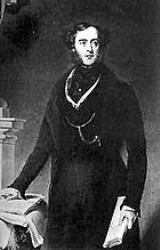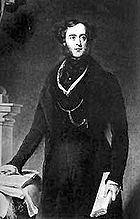
Lord George Bentinck
Encyclopedia

England
England is a country that is part of the United Kingdom. It shares land borders with Scotland to the north and Wales to the west; the Irish Sea is to the north west, the Celtic Sea to the south west, with the North Sea to the east and the English Channel to the south separating it from continental...
Conservative
Conservative Party (UK)
The Conservative Party, formally the Conservative and Unionist Party, is a centre-right political party in the United Kingdom that adheres to the philosophies of conservatism and British unionism. It is the largest political party in the UK, and is currently the largest single party in the House...
politician
Politician
A politician, political leader, or political figure is an individual who is involved in influencing public policy and decision making...
and racehorse owner, best known (with Benjamin Disraeli) for his role in unseating Sir Robert Peel
Robert Peel
Sir Robert Peel, 2nd Baronet was a British Conservative statesman who served as Prime Minister of the United Kingdom from 10 December 1834 to 8 April 1835, and again from 30 August 1841 to 29 June 1846...
over the Corn Laws
Corn Laws
The Corn Laws were trade barriers designed to protect cereal producers in the United Kingdom of Great Britain and Ireland against competition from less expensive foreign imports between 1815 and 1846. The barriers were introduced by the Importation Act 1815 and repealed by the Importation Act 1846...
.
Bentinck was a younger son of the 4th Duke of Portland
William Bentinck, 4th Duke of Portland
William Henry Cavendish Cavendish-Scott-Bentinck, 4th Duke of Portland PC, FRS, FSA , styled Marquess of Titchfield until 1809, was a British politician who served in various positions in the governments of George Canning and Lord Goderich.-Background and education:Portland was the eldest son of...
, and elected a Member of Parliament
Member of Parliament
A Member of Parliament is a representative of the voters to a :parliament. In many countries with bicameral parliaments, the term applies specifically to members of the lower house, as upper houses often have a different title, such as senate, and thus also have different titles for its members,...
(MP) for King's Lynn
King's Lynn (UK Parliament constituency)
King's Lynn was a constituency in Norfolk, known as Lynn or Bishop's Lynn prior to 1537, which returned two Members of Parliament to the House of Commons of the Parliament of the United Kingdom until 1885, and one member thereafter. Until 1918 it was a parliamentary borough, after which the name...
in 1828, which constituency he represented, in succession to his uncle, William Henry Cavendish-Bentinck
Lord William Bentinck
Lieutenant-General Lord William Henry Cavendish-Bentinck GCB, GCH, PC , known as Lord William Bentinck, was a British soldier and statesman...
, until his death. Although initially a follower of George Canning
George Canning
George Canning PC, FRS was a British statesman and politician who served as Foreign Secretary and briefly Prime Minister.-Early life: 1770–1793:...
, Bentinck supported the Whigs
British Whig Party
The Whigs were a party in the Parliament of England, Parliament of Great Britain, and Parliament of the United Kingdom, who contested power with the rival Tories from the 1680s to the 1850s. The Whigs' origin lay in constitutional monarchism and opposition to absolute rule...
over the question of parliamentary reform. However, in 1834 he broke with the Whigs and, like Lord Stanley
Edward Smith-Stanley, 14th Earl of Derby
Edward George Geoffrey Smith-Stanley, 14th Earl of Derby, KG, PC was an English statesman, three times Prime Minister of the United Kingdom, and to date the longest serving leader of the Conservative Party. He was known before 1834 as Edward Stanley, and from 1834 to 1851 as Lord Stanley...
and Sir James Graham, among others, joined the new Conservative Party (via the short lived political centre grouping known as the 'Derby Dilly
Derby Dilly
The Derby Dilly was a name given to a group of dissident Whigs and others in the United Kingdom led by the former Cabinet minister Edward, Lord Stanley, who would later become 14th Earl of Derby...
') which formed under the leadership of Peel.
Bentinck first became prominent in politics in 1846 when he, with Disraeli, led the protectionist opposition to the repeal of the Corn Laws
Corn Laws
The Corn Laws were trade barriers designed to protect cereal producers in the United Kingdom of Great Britain and Ireland against competition from less expensive foreign imports between 1815 and 1846. The barriers were introduced by the Importation Act 1815 and repealed by the Importation Act 1846...
. Until he rose to speak against their repeal, he had not spoken a word in eighteen years in Parliament. Historians see Bentinck's participation as vital, for the majority of those who opposed repeal were country gentlemen, who were far more likely to follow the son of a Duke than Disraeli, an Anglicized Sephardic-Jewish literary figure of somewhat ill-repute. Although Bentinck and Disraeli did not prevent the repeal of the Corn Laws, they did succeed in forcing Peel's resignation some weeks later over the Irish Coercion Bill. The Conservative Party broke in half; some hundred free-trade Peelites followed Peel, while two hundred and thirty protectionists formed the new Conservative Party, with Stanley (later the Earl of Derby) as overall leader. Bentinck became leader of the party in the House of Commons
British House of Commons
The House of Commons is the lower house of the Parliament of the United Kingdom, which also comprises the Sovereign and the House of Lords . Both Commons and Lords meet in the Palace of Westminster. The Commons is a democratically elected body, consisting of 650 members , who are known as Members...
.
Bentinck resigned the leadership in 1848, his support of Jewish emancipation being unpopular with the bulk of the party, and was succeeded by the Marquess of Granby
Charles Manners, 6th Duke of Rutland
Charles Manners, 6th Duke of Rutland KG , styled Marquess of Granby before 1857, was an English Conservative politician.-Background and education:...
. He died of a heart attack in September of that year. There have been rumours, first appearing in the memoirs of the politician and journalist Louis John Jennings
Louis John Jennings
Louis John Jennings was an English journalist and Conservative politician.Jennings was born in Walworth, London, the son of John Jennings and his wife Sarah Michel. He joined The Times newspaper and between 1863 and 1868 was their special correspondent in India and the USA...
, that it was not a heart attack. Bentinck's interest in horse racing may have led to his betting against Dr. William Palmer
William Palmer
William Palmer may refer to: *William Palmer , British Olympic athlete* William Palmer , English cricketer*William Palmer , doctor and multiple murderer...
of Rugeley, and Jennings suggested that Palmer poisoned Bentinck. Most historians dismiss this story as false.
Clerk to the Privy Council
Privy council
A privy council is a body that advises the head of state of a nation, typically, but not always, in the context of a monarchic government. The word "privy" means "private" or "secret"; thus, a privy council was originally a committee of the monarch's closest advisors to give confidential advice on...
Charles Greville
Charles Cavendish Fulke Greville
Charles Cavendish Fulke Greville was an English diarist and an amateur cricketer who played first-class cricket from 1819 to 1827...
wrote after Bentinck's death: "He brought into politics the same ardour, activity, industry and cleverness which he had displayed on the turf . . . having once espoused a cause and espoused a party, from whatever motive, he worked with all the force of his intellect and a superhuman power of application in what he perceived to be the interest of that party and that cause . . .
In addition to his political activities, Bentinck was well known for his interest in "the Turf." Bentinck owned several successful race horses and his stable was renowned for its quality. Bentinck was particularly admired in many quarters for his efforts to eliminate fraud in the sport.
He is commemorated with a statue in London's Cavendish Square
Cavendish Square
Cavendish Square is a public square in the West End of London, very close to Oxford Circus, where the two main shopping thoroughfares of Oxford Street and Regent Street meet. It is located at the eastern end of Wigmore Street, which connects it to Portman Square, part of the Portman Estate, to its...
Gardens.
The department of Manuscripts and Special Collections, The University of Nottingham
Manuscripts and Special Collections, The University of Nottingham
Manuscripts and Special Collections is part of Information Services at the University of Nottingham. It is based at King's Meadow Campus in Nottingham in England...
holds the correspondence and personal papers of Lord George Bentinck (Pw L), as part of the Portland (Welbeck) Collection.
The Portland Estate Papers held at Nottinghamshire Archives also contain items relating to the 5th Duke's properties.
Further reading
- Benjamin Disraeli, Lord George Bentinck. A Political Biography (London, 1852).
- Anna Gambles, Protection and Politics: Conservative Economic Discourse, 1815-1852 (Cambridge University Press, 1971).
- Angus Macintyre, ‘Lord George Bentinck and the Protectionists: A Lost Cause?’, Transactions of the Royal Historical Society, 39 (1989), pp. 141-165.
External links
- Lord George Bentinck - A Political Biography, by Benjamin Disraeli, from Project GutenbergProject GutenbergProject Gutenberg is a volunteer effort to digitize and archive cultural works, to "encourage the creation and distribution of eBooks". Founded in 1971 by Michael S. Hart, it is the oldest digital library. Most of the items in its collection are the full texts of public domain books...
- Bentinck on nottshistory.org.uk
- Biography of Lord George Bentinck, with links to online catalogues, from Manuscripts and Special Collections, The University of Nottingham

